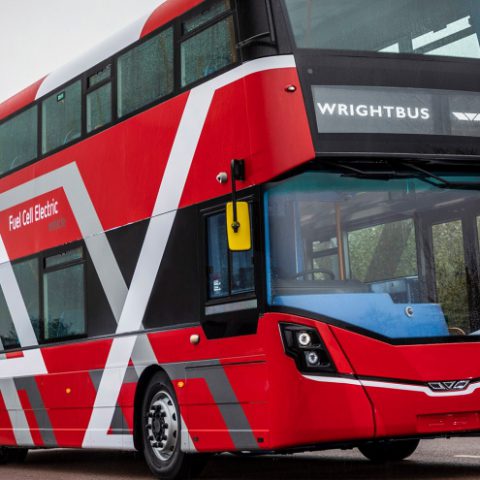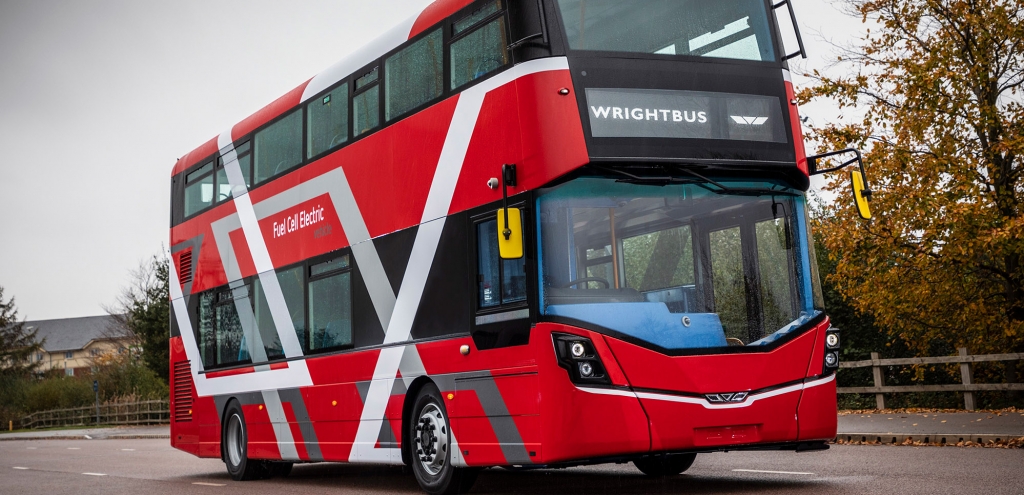Hydrogen double-deckers, the world’s first time in Aberdeen
They are waited as the first hydrogen-powered double-decker buses and they’ll be working in the Scottish city of Aberdeen from the summer, following a first approach with the city that will begin in spring with a period of final testing and training for drivers. Wrightbus is almost ready to deliver as many as 15 hydrogen-powered double-deckers Streetdeck […]

They are waited as the first hydrogen-powered double-decker buses and they’ll be working in the Scottish city of Aberdeen from the summer, following a first approach with the city that will begin in spring with a period of final testing and training for drivers. Wrightbus is almost ready to deliver as many as 15 hydrogen-powered double-deckers Streetdeck FCEV.

Hydrogen double-deckers ready for Aberdeen
First Aberdeen, part of the multinational company First Group which originated in the city, is to run the 15 buses along one of its most popular service routes. The new £8.3million project (9.5 million euros) has been funded by Aberdeen City Council, the Scottish Government, and the European Union (FCH JU), with an investment of about £500,000 per vehicle.
The UK’s first hydrogen production and bus refuelling station was opened in Aberdeen in 2015, as part of a £19million green transport demonstration project. The Aberdeen City Council-led project tested the economic and environmental benefits of hydrogen transport technologies and aims to drive the development of hydrogen technologies.
Wrightbus fuel cell bus in Aberdeen
The buses have been produced by Northern Ireland-based company Wrightbus. The manufacturer has been close to bankruptcy in 2019 before being taken over by Jo Bamford, grandson of JCB founder Joseph Bamford.
The buses ordered by Aberdeen are Wrightbus Streetdeck FCEV, that the company claimed to be the first fuel cell double decker bus ever produced (Wrightbus was followed by ADL). Fuel cell system, on the Streetdeck FCEV, is made by Ballard Power Systems, that launched the new fuel cell module, addressed to transit buses, FCmove-HD. The vehicle was unveiled at Euro Bus Expo 2018 in Birmingham, two years after having presented a concept. It has been tested in Aberdeen since 2018.
First will operate the vehicles will be mainly on the Service 19 (Peterculter to Tillydrone) and the Service X27 (City Centre to Aberdeen International Airport via Dyce station) routes and is part-funded by the European Union’s JIVE project, which aims to aid commercialisation of hydrogen buses through joint procurement between cities. Cities that will follow Aberdeen’s footsteps include London and Birmingham, with Dundee and Brighton and Hove being lead partners in JIVE2.
The world’s first city with hydrogen double-deckers
Aberdeen City Council Co-Leader Councillor Jenny Laing said: “Aberdeen is at the forefront of developing green technologies and our continued innovative commitment to hydrogen truly puts us on the global map. The new buses come with even better technology helping to tackle air pollution in the city and further makes Aberdeen an entrepreneurial and technological leader by pushing boundaries for hydrogen. We are really proud to be the world’s first city with hydrogen double-deckers, and we look forward to seeing them on the city’s roads.”
David Phillips, Operations Director for First Aberdeen, said: “We are delighted to be working in partnership with Aberdeen City Council to deliver these state-of-the-art and ground-breaking new buses to the people of Aberdeen. We are in the process of adapting our depot to accommodate these environmentally friendly zero-emission vehicles and are upskilling all our staff to accommodate this next generation of buses. It is a huge effort from all our staff to deliver this project, so we extremely proud to be a part of this project in helping the city to lead the way on the hydrogen journey.”
Net-zero emissions target in 2045 for Aberdeen
Scotland’s Energy Minister, Paul Wheelhouse, said: “Scotland has some of the most ambitious emission reduction targets in the world so, in the years to come, I expect we will begin to see many more ‘greener and cleaner’ transport solutions like this begin to emerge. I’m proud that today’s announcement, which is a World first, has been made possible thanks in part to Scottish Government funding. We are currently undertaking a wide-ranging project to assess the potential for hydrogen and hydrogen fuel cells for use in transport and heating across Scotland. Hydrogen could well play an important role in the energy transition that’s required to meet our 2045 net-zero emissions target.”
John McLeister, Wrightbus Director for Sales and Business Development, said: “This is the start of an exciting chapter for Wrightbus in Aberdeen which will be the first city to introduce this large deployment of fuel cell zero-emission vehicles. We are thrilled at this opportunity to partner with First Aberdeen and Aberdeen City Council to deliver a green well to wheel zero-emission solution which will also showcase the world’s first fuel cell electric double-decker bus operation”.








